Nico Rosberg, the 2016 Formula 1 World Champion, has stirred speculation in the motorsport community by suggesting that Max Verstappen might retire earlier than expected. This commentary comes at a time when Verstappen, at just 27, has already achieved an impressive career with four world championships and 63 race victories. Rosberg’s insights, shaped by his own unique journey in F1, prompt a deeper examination of the pressures and expectations that accompany such success.
The Legacy of Nico Rosberg
Nico Rosberg, son of 1982 World Champion Keke Rosberg, raced in F1 from 2006 to 2016. His career peaked when he clinched the championship title with Mercedes, narrowly defeating his longtime rival Lewis Hamilton. Just five days after this monumental victory, Rosberg made headlines by announcing his retirement from the sport at the age of 31—an unprecedented move for a reigning champion. His decision was driven by a desire to step away at the top of his game and spend more time with his family, a sentiment he has reiterated since.

Rosberg’s recent comments regarding Verstappen’s potential early retirement resonate deeply, especially given Verstappen’s current accomplishments and his own words about the sport’s mental and physical toll. In an interview with La Gazzetta dello Sport, Rosberg remarked, “It’s possible. Max has already achieved so much, despite his young age. The intensity of Formula 1 leaves a mark on you, both mentally and physically.”
Verstappen’s Current Standing
Max Verstappen’s career trajectory has been nothing short of remarkable. He made his F1 debut at 17, becoming the youngest driver to compete in the series, and quickly established himself as a formidable talent. His current contract with Red Bull Racing extends until the end of the 2028 season, at which point he would be 31—paralleling Rosberg’s age at retirement.
Despite his youth, Verstappen has already realized many of his dreams in the sport. However, he has also expressed a desire for a life beyond F1. Unlike some of his contemporaries who envision racing into their 40s, Verstappen has been vocal about not wanting to extend his career indefinitely. He has shared his discomfort with the increasing number of races in the season and the modern changes in F1 that he feels detract from the sport’s core values.

The Pressure of Modern F1
The intensity and demands of Formula 1 have grown significantly, with a record 24 races on the calendar in 2023, alongside additional sprint races and media commitments. This grueling schedule takes a toll on drivers, both physically and mentally. Verstappen’s reflections on his experiences indicate a recognition of the sacrifices required to remain at the top of the sport. He has stated, “I don’t see myself spending three years in the midfield. I’d rather stay home or do something else.”
This mindset echoes Rosberg’s own sentiments before his retirement, suggesting a common understanding among drivers who achieve early success. Both recognize that the relentless pursuit of victory can lead to burnout, prompting them to reassess their priorities.
Jos Verstappen’s Insights
Adding another layer to this conversation is Jos Verstappen’s perspective as both a father and a former F1 driver. He has consistently highlighted Max’s individuality and unique approach to racing, noting that Max does not see himself following the traditional path of a driver who races into their 40s. Team principal Christian Horner has also commented on Max’s interests beyond F1, emphasizing that his enjoyment of racing is paramount. “As soon as that enjoyment drops, he’s got the strength of character to say, ‘Do you know what? I’m going to go and drive GTs next year?'” Horner explained.
This acknowledgment of Verstappen’s multifaceted interests suggests that while he is currently focused on F1, he may choose to pivot to other racing formats or pursuits if his passion for the sport wanes.
The Potential Impact of Early Retirement
The possibility of Verstappen retiring early raises significant questions about the future of Red Bull Racing and the broader F1 landscape. If Verstappen were to leave the sport, Red Bull would face the monumental task of finding a suitable replacement. The team has built much of its recent success around Verstappen’s exceptional talents, and losing him would require a complete reassessment of their future plans.
Moreover, Verstappen’s presence on the grid has contributed significantly to F1’s popularity, particularly among younger fans. His battles with Hamilton in 2021 and subsequent dominance have been central to many of the sport’s most compelling narratives. An early retirement could thus disrupt the competitive balance and fan engagement that Verstappen has helped foster.
Looking Ahead: Challenges and Opportunities
While Rosberg’s predictions and Verstappen’s statements are thought-provoking, they remain speculative. Factors such as the upcoming regulatory changes in 2026, which will overhaul F1’s technical rules and power units, could provide new challenges that might entice Verstappen to stay. Red Bull is developing its own power unit in partnership with Ford, presenting a unique opportunity for Verstappen to be part of a new chapter in the team’s history.
Additionally, the allure of chasing records, such as Hamilton’s seven world championships and 105 race wins, may motivate Verstappen to extend his career. Financial considerations also play a role, as F1 drivers are among the highest-paid athletes globally. Verstappen’s lucrative contract with Red Bull reflects the financial security that a long-term career in F1 can provide.
Conclusion
Nico Rosberg’s comments about Max Verstappen potentially retiring early call attention to the evolving nature of career longevity in Formula 1. As the demands of the sport increase and drivers like Verstappen reassess their priorities, the landscape of F1 may shift significantly in the coming years. While the possibility of Verstappen stepping away from the sport early remains speculative, it highlights the complexities of balancing personal fulfillment with the pressures of elite-level competition. As fans look forward to future seasons, the decisions made by drivers today will undoubtedly shape the future of Formula 1.
